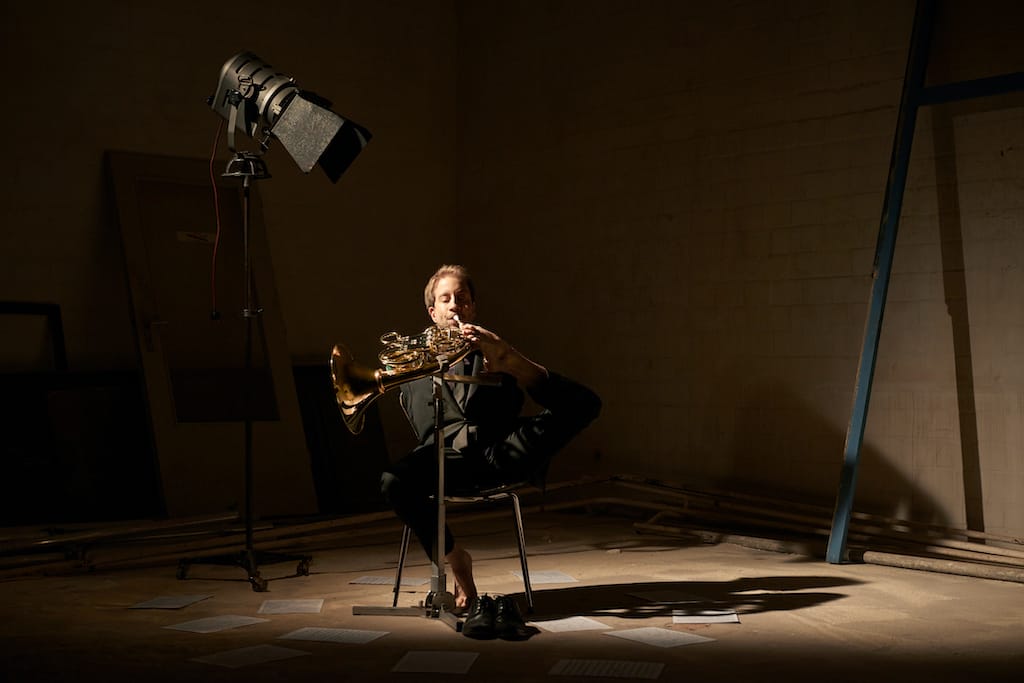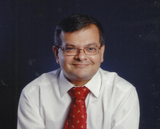The Remarkable Journey of Felix Klieser

One of the many things I love about listening to internet radio podcasts, especially when listening to music is that the focus is solely on the aural sense, as opposed to watching a concert. I am able to listen more attentively without the distraction of the visual element.
But occasionally that same absence can throw up some surprises. I have been listening sequentially to the BBC Proms concerts and had got to Prom 24. The description said simply “Felix Klieser plays Mozart.”
I looked up the concert programme, and it mentioned Mozart’s Horn Concerto No. 4 in E flat major with Felix Klieser, soloist, making his Proms debut with the Bournemouth Symphony Orchestra conducted by Kirill Karabits. There was a tiny thumbnail picture of Klieser in profile playing the French horn, but I didn’t really look at it closely as I wanted to start listening.
All very well so far. There was another work before the Mozart, and then the presenter Martin Handley began to speak to Klieser in a (pre-recorded) interview as a sort of filler between the pieces. I must have got up to stretch my legs, as I missed a few seconds of the discussion.
So I did a double-take when I heard Handley ask Klieser: “Have you always had great toe flexibility?”
What had toe flexibility to do with playing the French horn? I rewound a bit, and that’s how I first learned that Klieser was born without arms.
I listened open-mouthed to his performance (and, the last movement of Mozart’s Horn Concerto No 2 also in E Flat Major as an encore piece in response to deafening applause). Talk about “great toe flexibility”, dexterity even! His musicianship was in every respect top-drawer.
I took a break from listening to the rest of that Prom, because I absolutely had to learn more about this awe-inspiring musician.
It is an interesting story. He comes from a “non-musical” family. They didn’t go or take him to concerts. Yet, at the age of four, young Felix had “decided” he was going to learn to play the French horn.
“My parents didn’t even know what a French horn looked like!” he told the Guardian in a pre-concert interview.
Luckily for Klieser and family, the city they were living in, Göttingen Germany, although small, had a music school with one solitary horn teacher.
Perhaps understandably, given Klieser’s situation, he was at first gently asked if he’d like to try another musical instrument, like the piano or drums. He remembers being very angry by that.
“The idea was not to make music. The idea was to play the horn!”
That obstinacy won the day. He would go on to study at Hanover’s Academy of Music, Theatre and Media at 17. He was a member of the much-coveted National Youth Orchestra of Germany from 2008-2011.
He told an interesting story about that experience in the Guardian interview. Klieser fist auditioned for the youth orchestra at 14, but didn’t make the cut. Ever the problem-solver, he tried to analyse why he wasn’t able to play his best when on stage.
The answer: his parents’ home was carpeted, and playing on that surface relaxed him. So he began to practice in the only room in the house that wasn’t carpeted: the bathroom!
At first, he felt ill at ease playing on that surface, in a “horrible acoustic”. But he kept at it, and now he can play anywhere, no problem. He auditioned again, and got in.
“When something is not working, you just have to understand why it is not working.”
As you can see from the accompanying photograph, Klieser plays the horn by using the toes of his left foot to operate the valves. The horn is held on a purpose-built tripod. He does not place a limb inside the bell of the horn (in contrast to the way the instrument is traditionally played, using the left hand to operate the valves and placing the right hand inside the bell).
“I am a person who loves problems,” he says. “I learned from very young that problems can be interesting.”
“I think it is possible to solve every problem in the world,” he told the Guardian.
In physiological terms, one could speculate that the amount of “neural real estate” in Klieser’s brain (cerebral cortex) controlling motor and sensory function of his lower limbs grew much larger from early on, to compensate for the congenital absence of upper limbs. How else could one “command” one of the smaller toes to flex and extend with sufficient pressure to operate the mechanical workings of his instrument?
“The foot is maybe the one and only thing I didn’t have to practise. It was working from the very beginning.”
To a first-time observer, Klieser’s posture when he plays looks like a contortion of the body. But to him, it comes most naturally.
“From the outside, when I see myself playing, I also think, ‘Wow!’ But for me it’s like sitting on a sofa and watching a movie – the position is quite relaxed,” he told the Guardian.
In 2016 Klieser received the prestigious Leonard Bernstein award of the Schleswig-Holstein Musik Festival. He hasn’t looked back after that, with concert engagements taking him all over the world.
Over the 2021-2022 season he had a two-year residency with the Bournemouth Symphony Orchestra (with which band he also debuted at the BBC Proms), “perhaps the most important time of my life”, with concerts, chamber music recitals, playing in care homes and in schools.
The 32-year-old has an impish sense of humour. He turned his instrument into a celebrity of sorts. As Klieser had few concert engagements during the Covid pandemic, his horn stayed relatively idle in its case while Klieser bought a PlayStation and played games. He felt sorry for his instrument, so he bought some googly eyes and put them on him. And so ‘Alex’ as he calls his anthropomorphic instrument, was born. ‘Alex’ has his own Instagram page and has dressed up for Christmas and even learned to cook pasta.
Klieser is impatient when people assume that he must be “sad” because he was born without arms. “People see me and think, ‘This person has some problems’”, he told the Guardian. “And when I tell them, ‘No, I do everything myself, I have a nice job, I am really happy’, they say, ‘But you have to be really sad and life has to be hard!’ No! My life is beautiful. It’s because people see something missing. But the biggest limits people have are often the limits you cannot see. If people do not understand the possibilities they have, is that not a disability in itself?”
BBC Proms presenter in the pre-concert interview said to Klieser that his debut concert was a chance to show people “just what was achievable.” “It’s always great to give people motivation”, he replied. “There are so many people who have so much potential inside of them but they are afraid. Things are possible even if they don’t think they are possible.”
Klieser certainly demonstrated this by his virtuosic performance.
This article first appeared in The Navhind Times, Goa, India.





